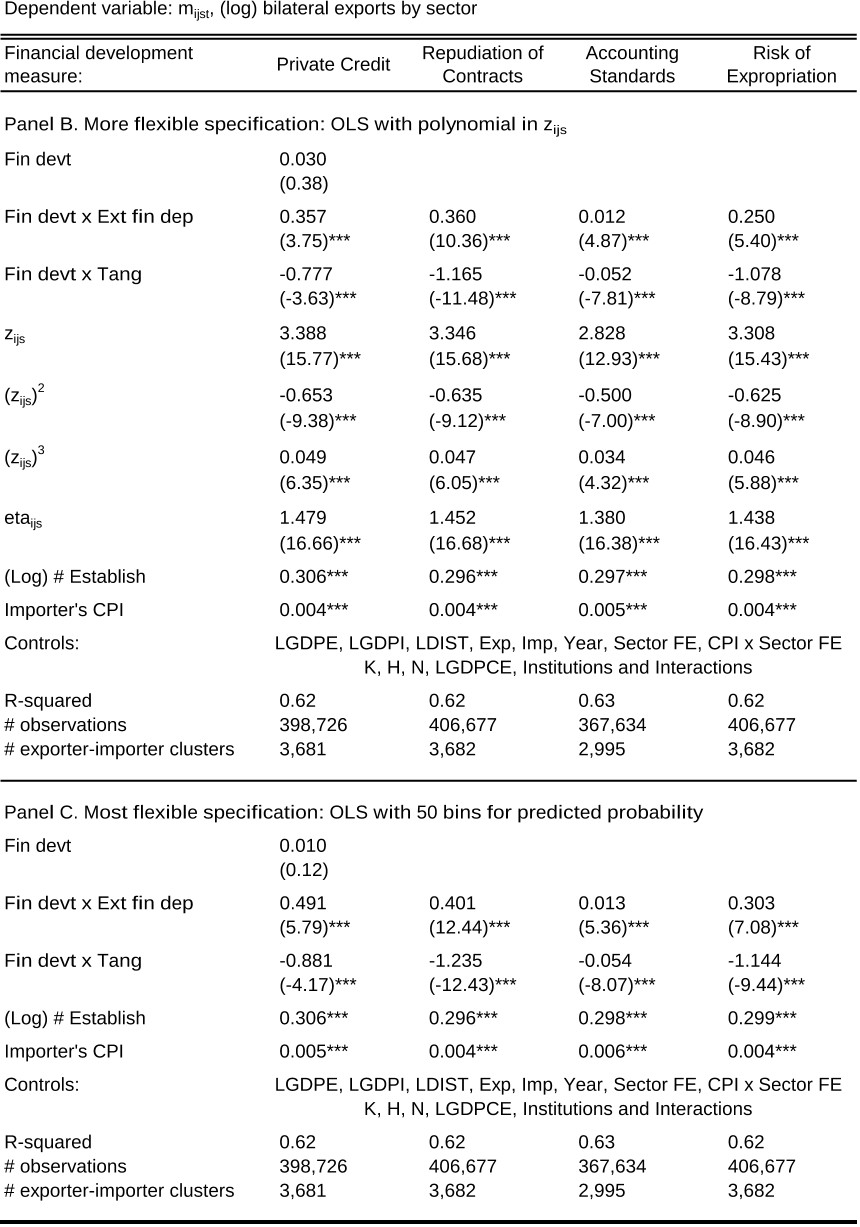Credit Constraints, Heterogeneous Firms and International Trade
Reads0
Chats0
TLDR
This article examined the detrimental consequences of financial market imperfections for international trade and developed a heterogeneous-firm model with countries at different levels of financial development and sectors of varying financial vulnerability.Abstract:
This paper examines the detrimental consequences of financial market imperfections for international trade. I develop a heterogeneous-firm model with countries at different levels of financial development and sectors of varying financial vulnerability. Applying this model to aggregate trade data, I study the mechanisms through which credit constraints operate. First, financial development increases countries' exports above and beyond its impact on overall production. Firm selection into exporting accounts for a third of the trade-specific effect, while two thirds are due to reductions in firm-level exports. Second, financially advanced economies export a wider range of products and their exports experience less product turnover. Finally, while all countries service large destinations, exporters with superior financial institutions have more trading partners and also enter smaller markets. All of these effects are magnified in financially vulnerable sectors. These results have important policy implications for less developed economies that rely on exports for economic growth but suffer from poor financial contractibility.read more
Figures

Table 10. Economic Significance: Predicted vs. Actual Trade Growth 
Table 9. Economic Significance: Comparative Statics 
Table 5. Financial Development and Firm-Level Exports 
Figure 3. The Productivity Cut-off for Exporting 
Table 5. Financial Development and Firm-Level Exports 
Table 1. Export Patterns in the Data
Citations
More filters
Journal ArticleDOI
The Great Collapse in Value Added Trade
Arne J. Nagengast,Robert Stehrer +1 more
TL;DR: In this paper, structural decomposition analysis of the great collapse in value added trade is used to find that changes in vertical specialization accounted for more than 40% of the trade collapse.
Labor Market Institutions, Firm-speci…c Skills, and Trade Patterns
TL;DR: In this paper, the authors develop a model in which workers undertake non-contractible activities to acquire skills on the job and show that countries with more protective labor laws export relatively more in skill-intensive sectors through both the intensive and extensive margins of trade.
Journal ArticleDOI
Family Firms, Corporate Governance and Export
TL;DR: This article investigated the effects of family ownership on export using rich data on Italian firms and found that family ownership increases the probability that firms export, especially when family owners retain control rights and seek the support of external managers.
Journal ArticleDOI
Equilibrium Effects of Firm Subsidies
TL;DR: In 2006, India changed the eligibility criteria for small-firm subsidies, and the sales of newly eligible firms grew by roughly 35 percent as mentioned in this paper, with almost complete crowdout within products that were less internationally traded, but little crowd-out for more-traded products.
Posted Content
Financial Crises and International Trade: The Long Way to Recovery
TL;DR: In this article, the authors provide a simple theoretical framework which shows that a currency crisis affects trade through competitiveness effect, i.e. a variation in relative prices, that positively influences the intensive margin of trade (the amount of exports by firms), and balance-sheet effect (i.e., a modification of the fixed cost of exports, which negatively affects the number of exporters).
References
More filters
Posted Content
Law and Finance
Rafael La Porta,Rafael La Porta,Florencio Lopez de Silanes,Florencio Lopez de Silanes,Andrei Shleifer,Andrei Shleifer,Robert W. Vishny,Robert W. Vishny +7 more
TL;DR: This paper examined legal rules covering protection of corporate shareholders and creditors, the origin of these rules, and the quality of their enforcement in 49 countries and found that common law countries generally have the best, and French civil law countries the worst, legal protections of investors.
Journal ArticleDOI
Law and Finance
TL;DR: In this article, the authors examined legal rules covering protection of corporate shareholders and creditors, the origin of these rules, and the quality of their enforcement in 49 countries and found that common-law countries generally have the strongest, and French civil law countries the weakest, legal protections of investors, with German- and Scandinavian-civil law countries located in the middle.
Journal ArticleDOI
The Impact of Trade on Intra-Industry Reallocations and Aggregate Industry Productivity
TL;DR: This paper developed a dynamic industry model with heterogeneous firms to analyze the intra-industry effects of international trade and showed how the exposure to trade will induce only the more productive firms to enter the export market (while some less productive firms continue to produce only for the domestic market).
Journal ArticleDOI
Finance and Growth: Schumpeter Might Be Right
TL;DR: In this paper, the authors examined a cross-section of about 80 countries for the period 1960-89 and found that various measures of financial development are strongly associated with both current and later rates of economic growth.
ReportDOI
Financial Dependence and Growth
Raghuram G. Rajan,Raghuram G. Rajan,Raghuram G. Rajan,Luigi Zingales,Luigi Zingales,Luigi Zingales +5 more
TL;DR: This paper examined whether financial development facilitates economic growth by scrutinizing one rationale for such a relationship; that financial development reduces the costs of external finance to firms, and found that industrial sectors that are relatively more in need of foreign finance develop disproportionately faster in countries with more developed financial markets.